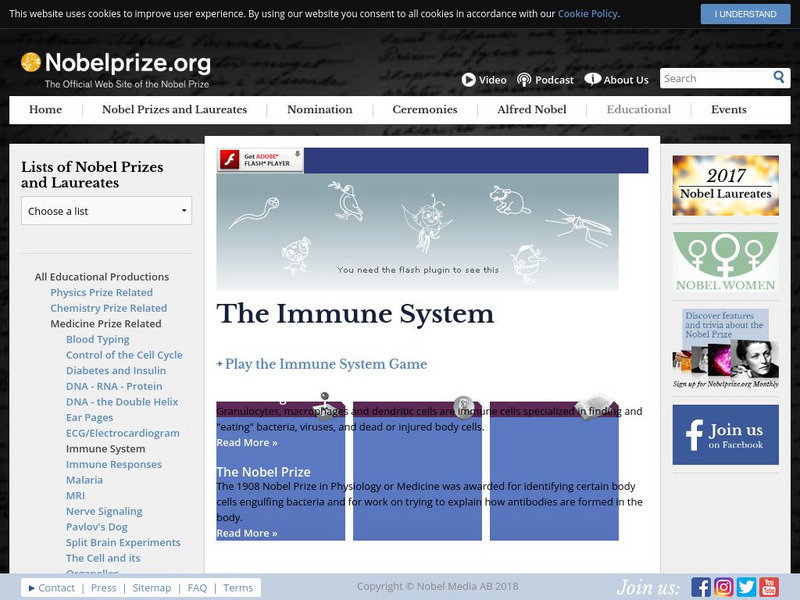TeachEngineering
Teach Engineering: Biosensors for Food Safety
How can you tell if harmful bacteria are in your food or water that might make you sick? What you eat or drink can be contaminated with bacteria, viruses, parasites and toxins pathogens that can be harmful or even fatal. Students learn...
Nobel Media AB
The Nobel Prize: The Immune System: Defending Our Bodies
Great game through which students learn about the immune system. Students read about cells that specialize in "finding and 'eating' bacteria, viruses, and dead or injured cells" and about the Nobel Prize in Physiology.
US Geological Survey
Usgs: National Water Quality Assessment Program
Use this website to find out about water quality issues anywhere in the U.S.A. where water studies have been conducted by the U.S. Geological Survey.
A&E Television
History.com: Social Distancing and Quarantine Were Used in Medieval Times to Fight the Black Death
Way back in the 14th century, public health officials didn't understand viruses, but they understood the importance of keeping a distance and disinfecting. Almost 700 years ago, the overwhelmed physicians and health officials fighting...
BioEd Online
Bio Ed Online: The Science of Microbes: The Variety and Roles of Microbes
Learners learn about the four major groups of microbes and their characteristics, and the roles microbes have in the world. The instructional activity and PowerPoint slides can be downloaded. The included instructional video on the four...
Nobel Media AB
The Nobel Prize: Wendell Stanley Biographical
This is a brief Nobel E-Museum biography on Wendell Meredith Stanley, the scientist and co-recipient of the 1946 Nobel Prize in Chemistry.Read about his education, as well as his contributions to various scientific studies through which...
Mayo Clinic
Mayo Clinic: Food Borne Illness
This site from MayoClinic.com provides great information on food-borne illness. The article is somewhat brief, but provides an excellent overview on the subject.
Ducksters
Ducksters: Biology for Kids: Infectious Disease
Kids learn about infectious diseases including pathogens such as viruses, bacteria, parasites, and fungi as well as transmission and other types of diseases.
Ducksters
Ducksters: Biology for Kids: Immune System
Study how the immune system helps to protect us against diseases and pathogens such as viruses, bacteria, and parasites.
Next.cc
Next: Germs
Engage in the activities provided to learn what you can do to protect your body from harmful germs. Click on the links for further exploration.
United Nations
United Nations Cyberschoolbus: Fighting Disease
The United Nations has distributed this list to make school age children aware of the communicable diseases that have most recently had an effect on society. Good descriptions are provided for each of the 11 diseases.
CK-12 Foundation
Ck 12: Barriers to Pathogens
[Free Registration/Login may be required to access all resource tools.] In the following tutorial you will learn about the barriers that keep most pathogens out of the human body.
Michigan State University
Michigan State University: Digital Learning Center for Microbial Ecology: The Curious Microbe
This interesting site focuses on unusual microbes that inhabit an extreme environmental niche on our planet. Individual articles are written in a tone suitable for general audience.
ClassFlow
Class Flow: Germ Theory Jeopardy
[Free Registration/Login Required] This flipchart is a Jeopardy game where students will review and discuss the development of the Germ Theory, as well as cell organelles and bacterial and viral diseases.
Merriam-Webster
Merriam Webster: Dictionary Illustration: Bacteriophage
Labeled illustration of a bacteriophage.
Other popular searches
- Viruses and Bacteria
- Fungi Bacteria and Virus
- Virus and Bacteria
- Compare Viruses and Bacteria
- Bacteria and Virus Crossword
- Bacteria and Virus Test
- Bacteria and Viruses Biology
- Virus Bacteria
- Bacteria Viruses Protists
- Bacteria and Viruses Review
- Biology Bacteria and Virus
- Bacteria Virus Protist














